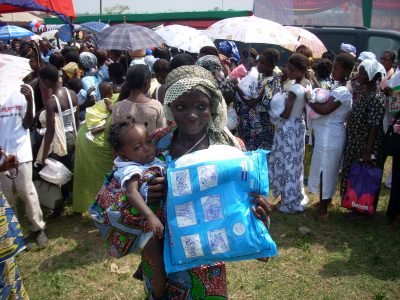As part of the President’s Malaria Initiative (PMI), the USAID/Guinea Faisons Ensemble Project recently trained 207 community agents in ten prefectures on behavior change communication (BCC), malaria prevention, rapid diagnostic tests (RDTs), treatment using artemisinin-based combination therapies (ACTs), and monitoring and evaluation.
According to national health statistics from 2007, malaria is the leading cause of consultation (34 percent), hospitalization (31 percent), and death (14.2 percent) in Guinea. Children under five and pregnant women are particularly at risk. To achieve universal coverage of malaria prevention and treatment interventions consistent with World Health Organization recommendations, Guinea’s Ministry of Health adopted a community case management strategy for malaria.
As part of the President’s Malaria Initiative (PMI), the USAID/Guinea Faisons Ensemble Project recently trained 207 community agents in ten prefectures on behavior change communication (BCC), malaria prevention, rapid diagnostic tests (RDTs), treatment using artemisinin-based combination therapies (ACTs), and monitoring and evaluation. The project also trained local nongovernmental organizations to support and supervise community agents’ activities.
Following the training, each community agent received a kit with ACTs, RDTs, gloves, a waste disposal box, management tools, and storyboards for BCC activities. Agents conduct home visits, averaging six patient consultations per week (in rural areas) or ten per week (in urban areas). They provide testing, treat all positive cases of simple malaria, and refer complicated cases to the nearest health facility.
A resident of Maneah, a town in the Kindia Region of western Guinea, said that since community agent Ousmane Bangoura started providing treatment for malaria in her community, she has stopped practicing self-medication and instead seeks his advice. “Before, I hesitated going to the health center because of the distance and also because I was not sure of getting drugs once at the center,” she said. “Now, I am comfortable — when somebody is sick, we go directly to him. He treats us and gives us good advice.”

